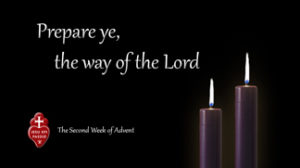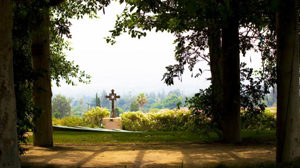Isaiah 40:25-31
Matthew 11:28-30
Reflection:
Isaiah describes God’s work of delivering Israel as: making a highway through a transformed, beautiful desert. It is a safe route, and even fools can’t make a wrong turn! ‘It is for those who have a journey to make’ (Is. 35:8-9). As a community in preparation we have set out to celebrate the unfolding of our salvation. Our journey takes place during a season for distraction, but it is cushioned with beautiful readings and music.
Isaiah tries to convince Israel that their rough road will be smooth, ‘come, heed my words and let’s go’. We may be finding the opposite these days? We want to ‘do Advent’; we desire the grace of this season. Do the readings today know that we often find ourselves, not lost on the highway, (this can’t happen), but none the less a bit out of sorts, maybe disappointed by unrealized expectations, or having begun the Holy Year of Mercy, and feeling our Holy Door is the revolving type, we go in circles and are never quite sure as we begin the day in which direction we will be launched?
Today is the feast of Juan Diego. ‘My little Juan’ as Mary affectionately calls him. Did Mary see in Juan what the Father saw in Mary herself? Juan’s revolving door had shot him out as a follower of Jesus, in a culture greatly in flux. What intimacy and joy Juan receives as Mary focuses upon him. Through this humble man she embraces a whole people and leads them to her Son. There was a lot of Advent going on as Mary shows Juan what surrendering to God’s Will can accomplish!
Our worries, doubts, weariness and temptations are those of Israel. But we want to savor the gifts being given to us, our salvation and God’s creative love beyond expectation. About halfway through Advent God’s Word finds us as Mary found Juan. What advice do we weary travelers receive as we set out today?
The one you seek, ‘He gives strength to the fainting; for the weak he makes vigor abound. Though young men faint and grow weary, and youths stagger and fall, they that hope in the Lord will renew their strength, they will soar as with eagles’ wings; They will run and not grow weary, walk and not grow faint. (Is.40:28-31).
We might ask, ‘What direction?’ as we come closer to our goal?’ ‘Come to me, all you who are weary and find life burdensome, and I will refresh you. Take my yoke upon your shoulders and learn from me, for I am gentle and humble of heart. Your souls will find rest, for my yoke is easy and my burden light. (Mt. 12:28-30). Don’t give up, the best is yet to come.
Fr. William Murphy, CP is the pastor of Immaculate Conception parish in Jamaica, New York.








